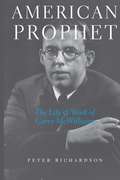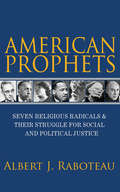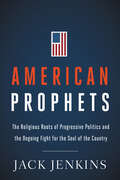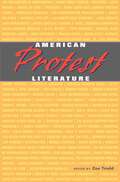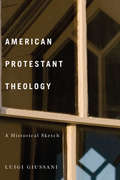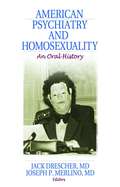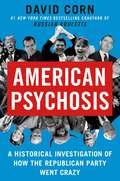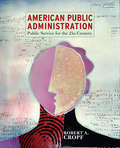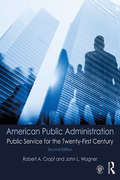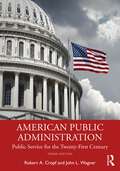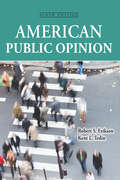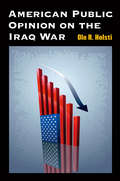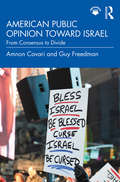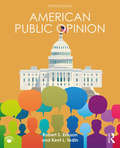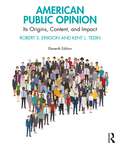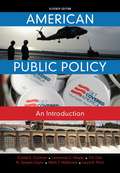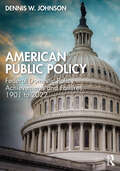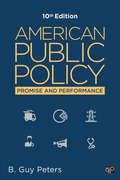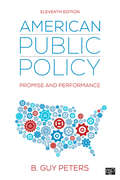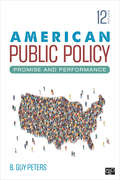- Table View
- List View
American Prophet: The Life & Work of Carey McWilliams
by Peter RichardsonA long-overdue book on the brilliant life and career of one of our greatest public intellectuals, American Prophet will introduce Carey McWilliams to a new generation of readers. Peter Richardson's absorbing and elegantly paced book reveals a figure thoroughly engaged with the issues of his time. Deftly interweaving correspondence, diary notes, published writings, and McWilliams's own and others' observations on a colorful and influential cast of characters from Hollywood, New York, Washington, DC, and the American West, Richardson maps the evolution of McWilliams's personal and professional life. Among those making an appearance are H. L. Mencken (McWilliams's mentor and role model), Louis Adamic, John Fante, Robert Towne, Richard Nixon, Studs Terkel, J. Edgar Hoover, Arthur Schlesinger, Jr., and Joseph McCarthy. American Prophet illustrates the arc of McWilliams's life and career from his early literary journalism through his legal and political activism, his stint in state government, and his two decades as editor of the Nation. This book makes the case for McWilliams's place in the Olympian realm of our most influential and prescient political writers.
American Prophets: Seven Religious Radicals and Their Struggle for Social and Political Justice
by Albert J. RaboteauAmerican Prophets sheds critical new light on the lives and thought of seven major prophetic figures in twentieth-century America whose social activism was motivated by a deeply felt compassion for those suffering injustice.In this compelling and provocative book, acclaimed religious scholar Albert Raboteau tells the remarkable stories of Abraham Joshua Heschel, A. J. Muste, Dorothy Day, Howard Thurman, Thomas Merton, Martin Luther King, Jr., and Fannie Lou Hamer--inspired individuals who succeeded in conveying their vision to the broader public through writing, speaking, demonstrating, and organizing. Raboteau traces how their paths crossed and their lives intertwined, creating a network of committed activists who significantly changed the attitudes of several generations of Americans about contentious political issues such as war, racism, and poverty. Raboteau examines the influences that shaped their ideas and the surprising connections that linked them together. He discusses their theological and ethical positions, and describes the rhetorical and strategic methods these exemplars of modern prophecy used to persuade their fellow citizens to share their commitment to social change.A momentous scholarly achievement as well as a moving testimony to the human spirit, American Prophets represents a major contribution to the history of religion in American politics. This book is essential reading for anyone who is concerned about social justice, or who wants to know what prophetic thought and action can mean in today's world.
American Prophets: The Religious Roots of Progressive Politics and the Ongoing Fight for the Soul of the Country
by Jack Jenkins“[A] thoroughly reported [and] revelatory history about the intersection of progressive politics and religion in America” (Publishers Weekly).Since the 1970s, the Religious Right has established itself as a coalition of fundamentalist powerbrokers who set the standard for Christian political values. But, as religion reporter Jack Jenkins contends, the country is also driven by a vibrant, long-standing moral force from the left. Taking many forms and many names, the Religious Left has operated since America’s founding—praying, and protesting for progressive values such as abolition, labor reform, civil rights, environmental preservation.In American Prophets, Jenkins examines the re-emergence of progressive faith-based activism, detailing its origins and contrasting its goals with those of the Religious Right. Today’s rapidly expanding interfaith coalition — which includes Christians, Jews, Muslims, Buddhists, and other faiths — has become a force within the larger “resistance” movement. Jenkins profiles Washington political insiders—including former White House staffers and faith outreach directors for the campaigns of Barack Obama, John Kerry, and Hillary Clinton—as well as a new generation of progressive faith leaders, including:Linda Sarsour, co-chair of the Women’s MarchRev. Traci Blackmon, a pastor near Ferguson, Missouri, who lifts up black liberation efforts across the countrySister Simone Campbell, head of the Catholic social justice lobby and the “Nuns on the Bus” tour organizerNative American “water protectors” who demonstrated against the Dakota Access Pipeline in Standing RockBishop Gene Robinson, the first openly gay Episcopal bishop
American Protest Literature
by Zoe TroddAmerican Protest Literature presents sources from eleven protest movements-political, social, and cultural-from the Revolution to abolition to gay rights to antiwar protest. Each section reprints documents from the original phase of the movement as well as evidence of its legacy in later times. Informative headnotes place the selections in historical context and draw connections with other writings within the anthology and beyond. Sources include a wide variety of genres-pamphlets, letters, speeches, sermons, legal documents, poems, short stories, photographs, posters-and a range of voices from prophetic to outraged to sorrowful, from U. S. Presidents to the disenfranchised. Together they provide an enlightening and inspiring survey of this most American form of literature.
American Protest Literature (The John Harvard library #99)
by Howard Zinn“I like a little rebellion now and then”—so wrote Thomas Jefferson to Abigail Adams, enlisting in a tradition that throughout American history has led writers to rage and reason, prophesy and provoke. This is the first anthology to collect and examine an American literature that holds the nation to its highest ideals, castigating it when it falls short and pointing the way to a better collective future.American Protest Literature presents sources from eleven protest movements—political, social, and cultural—from the Revolution to abolition to gay rights to antiwar protest. Each section reprints documents from the original phase of the movement as well as evidence of its legacy in later times. Informative headnotes place the selections in historical context and draw connections with other writings within the anthology and beyond. Sources include a wide variety of genres—pamphlets, letters, speeches, sermons, legal documents, poems, short stories, photographs, posters—and a range of voices from prophetic to outraged to sorrowful, from U.S. Presidents to the disenfranchised. Together they provide an enlightening and inspiring survey of this most American form of literature.
American Protestant Theology
by Luigi Giussani Damian BacichIn American Protestant Theology, Luigi Giussani traces the history of the most meaningful theological expressions and the cultural significance of American Protestantism, from its origins in seventeenth-century Puritanism to the 1950s. Giussani clarifies and assesses elements of Protestantism such as the democratic approach to Church-State relations, "The Great Awakening," Calvinism and Trinitarianism, and liberalism. His rich references and analytical descriptions reconstruct an overview of the development of a religion that has great importance in the context of spiritual life and American culture. He also displays full respect for the religious depth from which Protestantism was born and where it can reach, and expresses great admiration for its most prominent thinkers and spiritual leaders, including Jonathan Edwards, Horace Bushnell, Walter Rauschenbusch, Reinhold Niebuhr, and Paul Tillich. Further testament to Giussani's clear-minded and comprehensive knowledge of Christianity, American Protestant Theology makes the work of a master theologian available in English for the first time.
American Psychiatry and Homosexuality: An Oral History
by Jack DrescherInterviews and first-hand accounts of an historic decision that affected the mental health profession—and American society and cultureThrough the personal accounts of those who were there, American Psychiatry and Homosexuality: An Oral History examines the 1973 decision by the American Psychiatric Association (APA) to remove homosexuality from its diagnostic and statistical manual of mental disorders (DSM). This unique book includes candid one-on-one interviews with key mental health professionals who played a role in the APA’s decision, those who helped organize gay, lesbian, and bisexual psychiatrists after the decision, and others who have made significant contributions in this area within the mental health field.American Psychiatry and Homosexuality presents an insider’s view of how homosexuality was removed from the DSM, the gradual organization of gay and lesbian psychiatrists within the APA, and the eventual formation of the APA-allied Association of Gay & Lesbian Psychiatrists (AGLP). The book profiles 17 individuals, both straight and gay, who made important contributions to organized psychiatry and the mental health needs of lesbian and gay patients, and illustrates the role that gay and lesbian psychiatrists would later play in the mental health field when they no longer had to hide their identities.Individuals profiled in American Psychiatry and Homosexuality include: Dr. John Fryer, who disguised his identity to speak before the APA’s annual meeting in 1972 on the discrimination gay psychiatrists faced in their own profession Dr. Charles Silverstein, who saw the diagnosis of homosexuality as a means of social control Dr. Lawrence Hartmann, who helped reform the APA and later served as its President in 1991-92 Dr. Robert J. Campbell, who helped persuade the APA’s Nomenclature Committee to hear scientific data presented by gay activists Dr. Judd Marmor, an early psychoanalytic critic of theories that pathologized homosexuality Dr. Robert Spitzer, who chaired the APA’s Nomenclature Committee Dr. Frank Rundle, who helped organize the first meeting of what would become the APA Caucus of Gay, Lesbian and Bisexual Psychiatrists Dr. David Kessler, AGLP President from 1980-82 Dr. Nanette Gartrell, a pioneer of feminist issues within the APA Dr. Stuart Nichols, President of the AGLP in 1983-84 and a founding member of the Gay and Lesbian Psychiatrists of New York (GLPNY) Dr. Emery Hetrick, a founding member of both AGLP and GLPNY Dr. Bertram Schaffner, who was instrumental in providing group psychotherapy for physicians with AIDS Dr. Martha Kirkpatrick, a long-time leader in psychiatry and psychoanalysis, both as a woman and an “out” lesbian Dr. Richard Isay, the first openly gay psychoanalyst in the American Psychoanalytic Association Dr. Richard Pillard, best known for studying the incidence of homosexuality in families of twins Dr. Edward Hanin, former Speaker of the APA Assembly Dr. Ralph Roughton, the first openly gay Training and Supervising Psychoanalyst to be recognized within the American and International Psychoanalytic AssociationsAmerican Psychiatry and Homosexuality presents the personal, behind-the-scenes accounts of a major historical event in psychiatry and medicine and of a decision that has affected society and culture ever since. This is an essential resource for mental health educators, supervisors, and professionals; historians; and LGBT readers in general.
American Psychosis: A Historical Investigation of How the Republican Party Went Crazy
by David Corn#1 New York Times bestselling author and investigative reporter David Corn tells the wild and harrowing story of the Republican Party&’s decades-long relationship with far-right extremism, bigotry, and paranoia. A fast-paced, rollicking, behind-the-scenes account of how the GOP since the 1950s has encouraged and exploited extremism, bigotry, and paranoia to gain power, American Psychosis offers readers a brisk, can-you-believe-it journey through the netherworld of far-right irrationality and the Republican Party&’s interactions with the darkest forces in America. In a compelling and thoroughly-researched narrative, Corn reveals the hidden history of how the Party of Lincoln forged alliances with extremists, kooks, racists, and conspiracy-mongers and fostered fear, anger, and resentment to win elections—and how this led to Donald Trump&’s triumph and the transformation of the GOP into a Trump personality cult that foments and bolsters the crazy and dangerous excesses of the right. The Trump-incited insurrectionist attack on the US Capitol on January 6, 2021, was no aberration. American Psychosis shows it was a continuation of the long and deep-rooted Republican practice of boosting and weaponizing the rage and derangement of the right. The gripping tale in American Psychosis covers the last seven decades. From McCarthyism to the John Birch Society to segregationists to the New Right to the religious right to Rush Limbaugh to Newt Gingrich to the militia movement to Fox News to Sarah Palin to the Tea Party to Trumpism, the Republican Party has deliberately nurtured and exploited rightwing fear and loathing fueled by paranoia, grievance, and tribalism. This powerful and important account explains how one political party has harnessed the worst elements in politics to poison the nation&’s discourse and threaten American democracy. "[Corn is] a great journalist. I love the way he thinks. I love the way he writes. I'm so glad he's done a super-readable, modern history of the right...We just need smart, digestible history about this stuff right now...[American Psychosis] is perfectly timed...Relevant history for where we are right now." —Rachel Maddow, host, The Rachel Maddow Show "With American Psychosis, David Corn 'did the full homework to take us all the way back to where it really begins.&’" —Lawrence O'Donnell, host, The Last Word
American Public Administration: Public Service for the 21st Century (2-downloads)
by Robert A. CropfIn addition to addressing the basics, American Public Administration: Public Service for the 21st Century stands out from other books in the market by offering a broader context in which to understand public administration and by devoting comprehensive coverage to current topics and trends, many of which are given chapter-length treatment (e.g., civil society, privatization, management information systems, and ethics). The most recent and compelling research is woven throughout every chapter to give students a useful, in-depth understanding of the field today. Real-world case studies and vignettes, helpful chapter pedagogy, an abundance of charts and graphs, and numerous Web listings help students learn and engage them in the text.
American Public Administration: Public Service for the Twenty-First Century
by Robert A. Cropf John L. WagnerAmerican Public Administration has been the go-to introductory textbook for Public Administration courses with a focus on civil society for the last decade. Now in an extensively revised and updated second edition, authors Cropf and Wagner weave the most recent and compelling research throughout every chapter to give students a useful, in-depth understanding of the field today. Changes to this edition include: A stronger focus on e-governance, and the ways in which technological change (e.g. social media, government information policy, surveillance) have transformed the government’s relationship with citizens as well as the role of the public servant/nonprofit worker at the federal, state, and local levels An expanded discussion of citizen participation in all aspects of governing, including the 2016 elections, the Occupy Wall Street movement, and the Black Lives Matter movement Updated mini case studies throughout the text on topics such as climate change, LGBT rights, and violent extremism to maximize student engagement A new section on major local government issues, including public–private partnerships, land-use planning, and economic development – and their relevance to Public Administration A chapter focusing on environmental policy administration and the role and responsibilities of public administrators in a time of global climate change Expanded coverage of the nonprofit sector and discussion of important linkages between Public Administration and Nonprofit Management A comprehensive suite of online supplements including PowerPoint slides, an Instructor’s Manual with suggested lectures, discussion questions, and a test bank (includes multiple choice, true-false, matching), as well as student exercises (written, individual, group, and web-based). Comprehensive, well-written, and offering a careful consideration of the fundamentals, American Public Administration, Second Edition is an ideal introductory text for courses at the undergraduate or graduate level, offering students a broader civil society context in which to understand public service.
American Public Administration: Public Service for the Twenty-First Century
by Robert A. Cropf John L. WagnerAmerican Public Administration has been the go-to introductory textbook for Public Administration courses with a focus on civil society for the better part of two decades. Now in an extensively revised and updated third edition, authors Cropf and Wagner weave the most recent and compelling research throughout every chapter to give students a useful, in-depth understanding of the field today. Changes to this edition include: Three new chapters, including one on public administration’s role in community resilience, a second on public administration and public health, and a complete rewrite of the chapter on managing information resources in public organizations. Extended discussions about the importance of civil society in public administration as well as the growing role of information technology, including the role of government in combating misinformation and disinformation. New coverage of topics, including but not limited to: the need for better disaster and pandemic planning at all levels of government; a need for greater preparedness related to global climate change; the worsening of the wealth inequality gap in the United States; America’s changing role in the world’s economy; important efforts to achieve racial, economic, and social equality and the response from government; and the increasing and evolving relationship between police and the community in the United States. Fully updated pedagogical tools including chapter summaries, discussion questions, brief case studies, case study discussion questions, key terms, and suggestions for further reading in each chapter, as well as accompanying support material that can be easily incorporated into Learning Management Systems (LMS), including Canvas and Blackboard. Comprehensive, well-written, and offering a careful consideration of the fundamentals, American Public Administration, Third Edition is an ideal introductory text for courses at undergraduate or graduate level, offering students a broader civil society context in which to understand public service.
American Public Opinion
by Robert S. Erikson Kent L. TedinCritically analyzes the integral role public opinion plays in American democracy Providing an in-depth analysis of public opinion, beginning with its origins in political socialization, the impact of the media, the extent and breadth of democratic values, and the role of public opinion in the electoral process, American Public Opinion goes beyond a simple presentation of data to include a critical analysis of the role of public opinion in American democracy.
American Public Opinion on the Iraq War
by Ole R. Holsti"A substantial contribution to understanding the role of public opinion and the news media during the Iraq War. Equally impressive, it effectively puts the domestic context of U. S. policy in historical perspective, making the book useful to historians as well as to political scientists. " ---Ralph B. Levering, Davidson College "American Public Opinion on the Iraq Warsets out to chart against a detailed account of the war a nuanced assessment of how public opinion on the conflict evolved, the partisan differences that emerged, how the issue affected other areas of foreign policy opinion, and the limits of public opinion on policy. It succeeds at all of this, and it does so in a manner that is at once informative, inherently interesting, and exceptionally easy to read. " ---Randolph M. Siverson, University of California, Davis Ole R. Holsti explores the extent to which changes in public opinion reflected the vigorous public relations efforts of the Bush administration to gain support for the war and the partisanship marking debates over policies toward Iraq. Holsti investigates the ways in which the Iraq experience has led substantial numbers of Americans to reconsider their nation's proper international role, and he assesses the impact that public opinion has had on policymakers. Significantly, Holsti places his findings in a broader context to address the role of public opinion and of the media in democratic governance.
American Public Opinion toward Israel: From Consensus to Divide
by Amnon Cavari Guy FreedmanThis book examines trends in American public opinion about Israel in over 75 years, from 1944 to 2019. Analyzing data from hundreds of surveys in jargon-free writing, the authors show that public support for Israel has seen a dramatic shift toward increased division between partisan and select demographic groups, elaborating on the implications that this important change may have for the countries’ special relationship. Scholars and students of American foreign policy, public opinion, Middle East politics and international relations, as well as policy analysts, policymakers, journalists and anyone interested in American policy toward Israel, will want to read this book. Special Features An Online Appendix including all surveys used throughout the book. A Roper Center-approved Data Tool that allows readers to create their own figures based on data used in the book: https://www.idc.ac.il/en/schools/government/research/apoi/pages/data-tool.aspx
American Public Opinion, Advocacy, and Policy in Congress
by Paul BursteinBetween one election and the next, members of Congress introduce thousands of bills. What determines which become law? Is it the public? Do we have government 'of the people, by the people, for the people?' Or is it those who have the resources to organize and pressure government who get what they want? In the first study ever of a random sample of policy proposals, Paul Burstein finds that the public can get what it wants - but mainly on the few issues that attract its attention. Does this mean organized interests get what they want? Not necessarily - on most issues there is so little political activity that it hardly matters. Politics may be less of a battle between the public and organized interests than a struggle for attention. American society is so much more complex than it was when the Constitution was written that we may need to reconsider what it means, in fact, to be a democracy.
American Public Opinion: Its Origins, Content, and Impact
by Robert S. Erikson Kent L. TedinProviding an in-depth analysis of public opinion, including its origins in political socialization, its role in the electoral process, and the impact of the media, American Public Opinion goes beyond a simple presentation of data to include a critical analysis of the role of public opinion in American democracy. New to the Tenth Edition Updates all data through the 2016 elections and includes early polling through 2018. Pays increased attention to polarization. Adds a new focus on public opinion and immigration. Covers new voting patterns related to race, ethnicity, and gender. Reviews public opinion developments on health care. Expands coverage of political misinformation, media bias, and negativity, especially in social media. Defends political polling even in the wake of 2016 failings.
American Public Opinion: Its Origins, Content, and Impact
by Robert S. Erikson Kent L. TedinProviding an in-depth analysis of public opinion, including its origins in political socialization, its role in the electoral process, and the impact of the media, American Public Opinion goes beyond a simple presentation of data to include a critical analysis of the role of public opinion in American democracy. New to the 11th Edition Updates all data through the 2020 elections and includes early polling through 2022. Pays increased attention to polarization. Expands focus on support for democratic values in the Trump and post-Trump era. Covers new voting patterns related to race, ethnicity, and gender. Expands coverage of political misinformation, media bias, and negativity, especially in social media. Defends political polling even in the wake of 2020 failings.
American Public Policy: An Introduction (11th Edition)
by N. Joseph Cayer Lawrence C. Mayer Clarke E. Cochran T. R. Carr Mark McKenzieAMERICAN PUBLIC POLICY: AN INTRODUCTION engages students with a unique emphasis on specific, substantive issues of public policy. It also kindles discussion that helps make public policy personal as students apply their knowledge to real-life policies. The authors present policy material step-by-step-explaining each policy’s historical context, building a picture of the existing policy, and prompting students to evaluate and discuss possible alternatives. This new edition includes updated and expanded coverage on key policy issues, including immigration, unemployment insurance, gun control, and the Affordable Care Act.
American Public Policy: Federal Domestic Policy Achievements and Failures, 1901 to 2022
by Dennis W. JohnsonThis is a sweeping narrative of American domestic public policy—its triumphs, struggles, and failures over the past 120 years. In a larger sense, it is a reflection on how the United States has grown and matured, faced challenges and opportunities, and how its federal leaders and policymakers have responded or failed to confront pressing problems. Moreover, American Public Policy addresses the hurdles and challenges that still lie ahead.Four critical questions are posed and answered. First, what were the most significant adversities endured by the American people? Second, what were the landmark domestic policies crafted by the president, enacted by Congress, or issued in Supreme Court decisions? Third, what did they fail to do? Finally, how well have federal policymakers met the key challenges facing America: income inequality, racism, financial crises, terrorist attacks, climate change, gun violence, and other pressures? And what do we still need to do?This book reaches out to students of public policy, American government, US history, and contemporary affairs, as well as to citizens, journalists, and policy practitioners.
American Public Policy: Promise and Performance
by B. Guy PetersAmerican Public Policy provides a comprehensive yet accessible overview of the landscape of public policy. This foundational text takes students through the governmental systems and core theories of policymaking before turning to in-depth exploration of key policy areas and tools of policy analysis. Important additions to this Tenth Edition include expanded discussions of policy instruments, the challenges for public policymakers presented by the continuing gridlock in Washington, the Affordable Care Act, higher education funding, reproductive rights, and gay rights. New coverage of fracking controversies, race and racial profiling, and the legalization of marijuana keeps students up to date with recent policy debates and issues.
American Public Policy: Promise and Performance
by B. Guy PetersAmerican Public Policy provides a comprehensive yet accessible overview of the landscape of public policy. This foundational text takes students through the governmental systems and core theories of policymaking before turning to in-depth exploration of key policy areas and tools of policy analysis. Important additions to this Tenth Edition include expanded discussions of policy instruments, the challenges for public policymakers presented by the continuing gridlock in Washington, the Affordable Care Act, higher education funding, reproductive rights, and gay rights. New coverage of fracking controversies, race and racial profiling, and the legalization of marijuana keeps students up to date with recent policy debates and issues.
American Public Policy: Promise and Performance
by B. Guy PetersThis updated edition of American Public Policy by B. Guy Peters provides a comprehensive yet accessible overview of the policy-making process from procedural approaches and policy instruments to in-depth analysis of specific policy issues. The Eleventh Edition considers how policy has been impacted by recent economic and political developments. Not shying away from the complexity of governmental procedure, Peters ensures that the mechanisms of the policy process are understandable through insightful discussions of topical policy areas.
American Public Policy: Promise and Performance
by B. Guy PetersThis updated edition of American Public Policy by B. Guy Peters provides a comprehensive yet accessible overview of the policy-making process from procedural approaches and policy instruments to in-depth analysis of specific policy issues. The Eleventh Edition considers how policy has been impacted by recent economic and political developments. Not shying away from the complexity of governmental procedure, Peters ensures that the mechanisms of the policy process are understandable through insightful discussions of topical policy areas.
American Public Policy: Promise and Performance
by B. Guy PetersAmerican Public Policy provides a comprehensive overview of the policy-making process. From procedural approaches and policy instruments to in-depth analysis of specific policy issues, bestselling author B. Guy Peters does not shy away from the complexity of governmental procedure and ensures that the mechanisms of the policy process are understandable through the discussion of topical policy areas. The Twelfth Edition shows readers how the background for policy in the United States has changed dramatically over the past several years in the midst of political polarization and gridlock, unemployment and recessions, and calls for greater diversity and inclusion. New topics include the eroding trust in government, the COVID-19 pandemic and relief packages, the expanding national debt, the rising costs of health care and calls for "Medicare for All", the rollback of environmental regulations under the Trump administration, and the rebuilding of alliances abroad. Included with this text The online resources for your text are available via the password-protected Instructor Resource Site.
American Public Policy: Promise and Performance
by B. Guy PetersAmerican Public Policy provides a comprehensive overview of the policy-making process. From procedural approaches and policy instruments to in-depth analysis of specific policy issues, bestselling author B. Guy Peters does not shy away from the complexity of governmental procedure and ensures that the mechanisms of the policy process are understandable through the discussion of topical policy areas. The Twelfth Edition shows readers how the background for policy in the United States has changed dramatically over the past several years in the midst of political polarization and gridlock, unemployment and recessions, and calls for greater diversity and inclusion. New topics include the eroding trust in government, the COVID-19 pandemic and relief packages, the expanding national debt, the rising costs of health care and calls for "Medicare for All", the rollback of environmental regulations under the Trump administration, and the rebuilding of alliances abroad. Included with this text The online resources for your text are available via the password-protected Instructor Resource Site.
